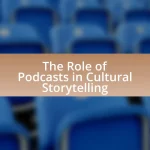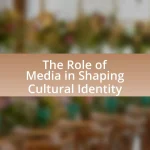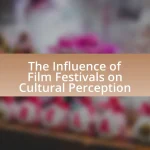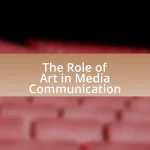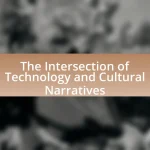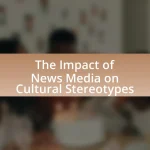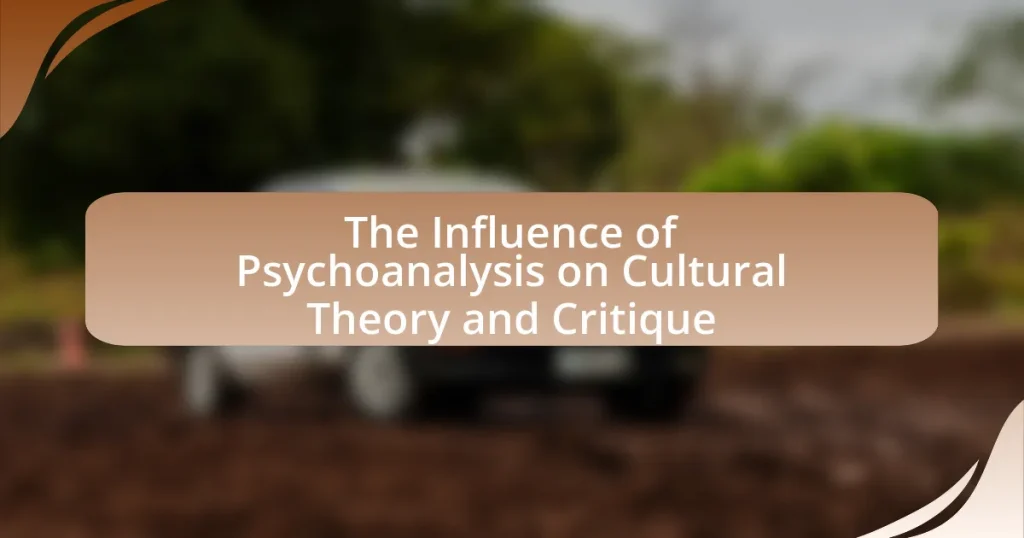The article examines the influence of psychoanalysis on cultural theory and critique, highlighting how foundational concepts such as the unconscious, repression, and the Oedipus complex provide frameworks for understanding cultural phenomena. It discusses the emergence of psychoanalysis as a significant analytical tool through the works of theorists like Sigmund Freud and Jacques Lacan, and its application in various fields, including literature, art, feminist theory, and postcolonial studies. The article also addresses critiques of psychoanalytic approaches, their limitations, and the methodologies derived from psychoanalysis that enhance cultural analysis, ultimately illustrating the transformative role of psychoanalysis in interpreting identity, power dynamics, and societal norms within cultural contexts.
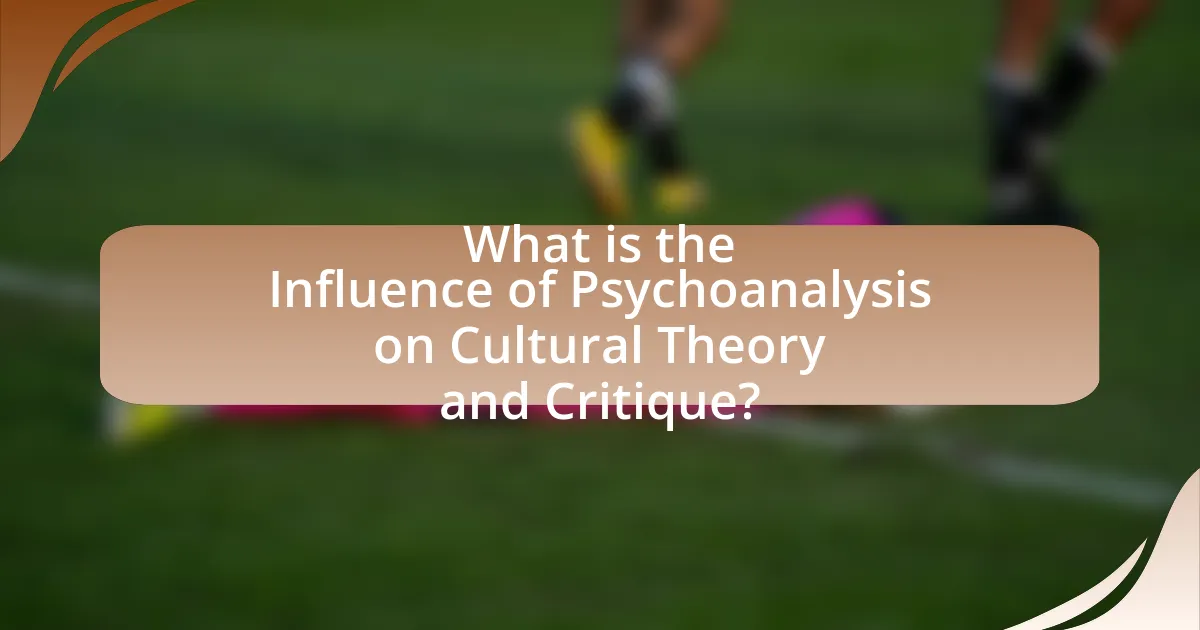
What is the Influence of Psychoanalysis on Cultural Theory and Critique?
Psychoanalysis significantly influences cultural theory and critique by providing frameworks for understanding the unconscious motivations behind cultural phenomena. This influence is evident in the works of theorists such as Sigmund Freud, whose concepts of repression and the unconscious have been applied to analyze literature, art, and social practices. For instance, Freud’s idea of the Oedipus complex has been utilized to explore familial and societal structures in various cultural texts. Additionally, Jacques Lacan’s reinterpretation of Freud’s theories emphasizes language and desire, impacting post-structuralist thought and feminist theory, as seen in the works of scholars like Julia Kristeva and Hélène Cixous. The application of psychoanalytic concepts allows for deeper insights into identity formation, power dynamics, and the role of fantasy in cultural narratives, thereby enriching cultural critique and theory.
How did psychoanalysis emerge as a significant framework in cultural theory?
Psychoanalysis emerged as a significant framework in cultural theory primarily through the work of Sigmund Freud, whose theories on the unconscious mind, repression, and the interpretation of dreams provided new insights into human behavior and cultural phenomena. Freud’s ideas influenced various fields, including literature, art, and sociology, by introducing concepts such as the Oedipus complex and the role of sexuality in shaping identity and culture. The application of psychoanalytic theory to cultural texts allowed scholars to analyze underlying psychological motivations and societal norms, thereby enriching the understanding of cultural artifacts. This integration was further developed by theorists like Jacques Lacan, who reinterpreted Freud’s ideas, emphasizing language and subjectivity, which expanded psychoanalysis’ relevance in cultural critique. The significant impact of psychoanalysis on cultural theory is evidenced by its adoption in critical studies, such as feminist theory and postcolonial studies, where it serves as a tool for deconstructing power dynamics and exploring identity formation.
What are the foundational concepts of psychoanalysis that impact cultural critique?
The foundational concepts of psychoanalysis that impact cultural critique include the unconscious, repression, and the Oedipus complex. The unconscious refers to the part of the mind that contains thoughts, memories, and desires not accessible to conscious awareness, influencing behavior and cultural expressions. Repression is the mechanism by which unacceptable thoughts and feelings are pushed out of conscious awareness, shaping societal norms and cultural taboos. The Oedipus complex, which describes a child’s unconscious desire for the opposite-sex parent and rivalry with the same-sex parent, provides insight into familial structures and gender roles within culture. These concepts enable critics to analyze cultural phenomena by revealing underlying psychological motivations and conflicts, thereby enriching the understanding of cultural dynamics.
How have key psychoanalytic theorists contributed to cultural theory?
Key psychoanalytic theorists have significantly contributed to cultural theory by providing frameworks that analyze the unconscious motivations behind cultural phenomena. Sigmund Freud’s exploration of the unconscious mind and its influence on behavior laid the groundwork for understanding how repressed desires shape cultural narratives. Jacques Lacan expanded on Freud’s ideas, emphasizing the role of language and the symbolic order in shaping identity and culture, which has been pivotal in post-structuralist thought. Additionally, theorists like Julia Kristeva introduced concepts such as intertextuality and the semiotic, linking psychoanalysis with literary and cultural criticism. These contributions have enabled a deeper understanding of how psychological processes inform cultural production and reception, illustrating the interplay between individual psyche and societal structures.
Why is psychoanalysis considered a transformative lens in understanding culture?
Psychoanalysis is considered a transformative lens in understanding culture because it reveals the unconscious motivations and desires that shape human behavior and societal norms. This framework allows for a deeper exploration of cultural phenomena, such as art, literature, and social practices, by uncovering the psychological underpinnings that influence them. For instance, Sigmund Freud’s theories on repression and the Oedipus complex provide insights into how familial relationships and societal expectations inform cultural narratives. Additionally, contemporary psychoanalytic theorists, like Julia Kristeva and Slavoj Žižek, extend these ideas to analyze how cultural texts reflect and challenge dominant ideologies, thus demonstrating the profound impact of unconscious processes on cultural production and reception.
What role does the unconscious play in cultural interpretation?
The unconscious plays a crucial role in cultural interpretation by influencing individuals’ perceptions, beliefs, and behaviors without their conscious awareness. Psychoanalytic theory posits that cultural artifacts, such as literature, art, and social norms, often reflect the repressed desires and anxieties of the collective unconscious. For instance, Sigmund Freud’s analysis of dreams and symbols illustrates how unconscious motivations shape cultural narratives and ideologies. This influence is evident in the way cultural products can evoke emotional responses that resonate with deeper psychological themes, thereby revealing underlying societal tensions and conflicts.
How does psychoanalysis challenge traditional cultural narratives?
Psychoanalysis challenges traditional cultural narratives by exposing the unconscious motivations and desires that underpin societal norms and values. This approach reveals that cultural narratives are often constructed from repressed emotions and conflicts, which are not readily acknowledged in mainstream discourse. For instance, Sigmund Freud’s theories illustrate how dreams and slips of the tongue can unveil hidden truths about individual and collective psyches, thereby questioning the validity of accepted cultural beliefs. Additionally, psychoanalytic criticism, as seen in the works of theorists like Julia Kristeva and Lacan, deconstructs texts and cultural artifacts to uncover the underlying psychological tensions that shape narratives, thus demonstrating that these narratives are not as stable or universal as they appear.
What are the main critiques of applying psychoanalysis to cultural theory?
The main critiques of applying psychoanalysis to cultural theory include its deterministic nature, reductionism, and lack of empirical support. Critics argue that psychoanalysis often reduces complex cultural phenomena to individual psychological processes, neglecting broader social, historical, and political contexts. Additionally, the deterministic aspects of psychoanalysis can undermine the agency of individuals and groups, suggesting that behavior is primarily driven by unconscious desires rather than conscious choices. Furthermore, the reliance on subjective interpretations and the absence of rigorous empirical validation raise concerns about the scientific credibility of psychoanalytic frameworks in cultural analysis. These critiques highlight the limitations of psychoanalysis in adequately addressing the multifaceted nature of culture.
What limitations exist within psychoanalytic approaches to culture?
Psychoanalytic approaches to culture face several limitations, primarily due to their focus on individual psychology rather than collective social dynamics. These approaches often overlook the influence of historical, economic, and political contexts on cultural phenomena, leading to a narrow interpretation of cultural practices. For instance, psychoanalysis tends to emphasize internal conflicts and unconscious motivations, which can neglect the role of social structures and cultural norms in shaping behavior. Additionally, psychoanalytic theories may lack empirical support, as they often rely on subjective interpretations rather than quantifiable data, making it difficult to validate their claims within broader cultural studies.
How have critics responded to the psychoanalytic framework in cultural studies?
Critics have responded to the psychoanalytic framework in cultural studies with a mix of support and skepticism. Supporters argue that psychoanalysis provides valuable insights into the unconscious motivations behind cultural phenomena, as seen in the works of theorists like Sigmund Freud and Jacques Lacan, who emphasize the role of desire and repression in shaping cultural narratives. Conversely, skeptics contend that the psychoanalytic approach can be overly deterministic and reductionist, often neglecting social, historical, and political contexts. For instance, feminist critics like Julia Kristeva and Hélène Cixous have highlighted the limitations of traditional psychoanalytic theories in addressing gender dynamics, advocating for a more nuanced understanding of identity and culture. This ongoing debate illustrates the complex relationship between psychoanalysis and cultural studies, reflecting broader tensions within the field regarding the interpretation of cultural texts and practices.
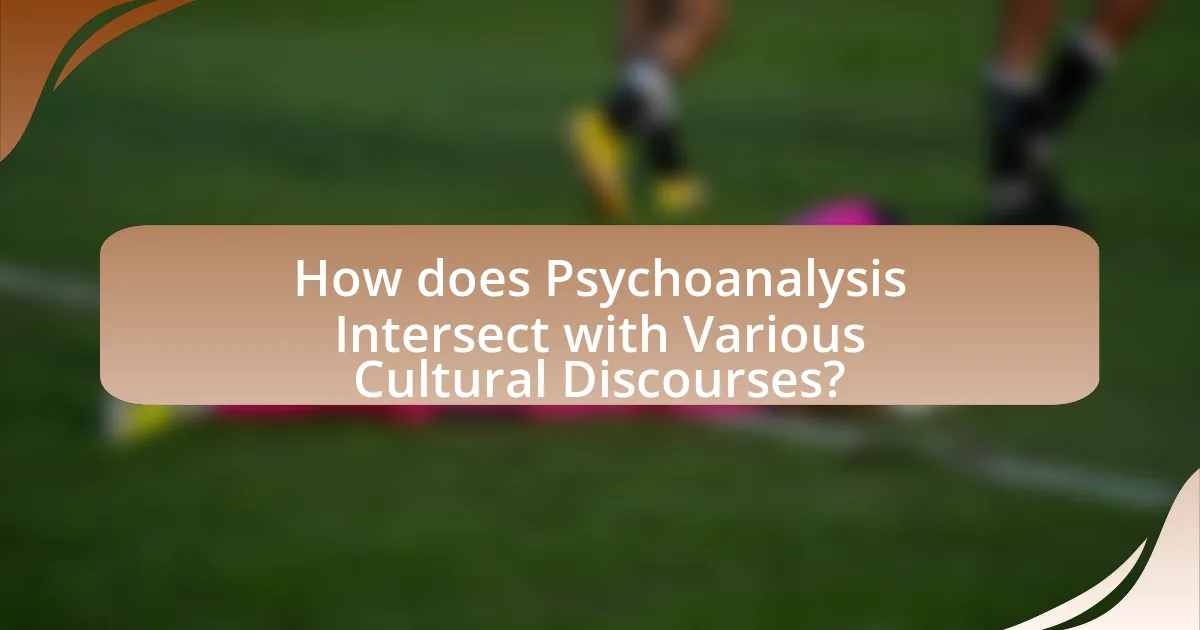
How does Psychoanalysis Intersect with Various Cultural Discourses?
Psychoanalysis intersects with various cultural discourses by providing a framework for understanding the unconscious motivations behind cultural phenomena. This intersection is evident in fields such as literature, film, and art, where psychoanalytic concepts like repression, desire, and the Oedipus complex are used to analyze characters and narratives. For instance, in literary criticism, Freud’s theories have been applied to explore the psychological depth of characters, revealing how their unconscious drives shape their actions and relationships. Additionally, psychoanalysis has influenced feminist theory, where it is used to critique patriarchal structures and examine the formation of gender identity. The application of psychoanalytic theory in these cultural contexts demonstrates its relevance in unpacking complex social dynamics and individual behaviors, thereby enriching cultural critique and theory.
What are the key cultural discourses influenced by psychoanalysis?
Key cultural discourses influenced by psychoanalysis include identity formation, sexuality, trauma, and the unconscious. Psychoanalysis has shaped the understanding of identity by emphasizing the role of internal conflicts and desires in personal development, as seen in the works of theorists like Jacques Lacan. Sexuality discourse has been profoundly impacted, particularly through Freud’s theories on repression and desire, which have informed feminist and queer theories. The concept of trauma, particularly in cultural narratives, has been explored through psychoanalytic frameworks, highlighting how personal and collective traumas shape cultural expressions. Additionally, the exploration of the unconscious has influenced literary criticism and art, prompting a deeper analysis of symbolism and meaning in cultural texts. These discourses demonstrate the pervasive influence of psychoanalytic thought across various fields, including literature, film, and social theory.
How does psychoanalysis inform feminist cultural critiques?
Psychoanalysis informs feminist cultural critiques by providing a framework for understanding the unconscious motivations behind gender dynamics and societal norms. This theoretical approach, rooted in the works of Sigmund Freud and later expanded by theorists like Jacques Lacan, emphasizes the role of desire, identity, and repression in shaping women’s experiences. Feminist scholars utilize psychoanalytic concepts to analyze how cultural representations perpetuate patriarchal ideologies and to explore the complexities of female subjectivity. For instance, the feminist critique of the male gaze, articulated by Laura Mulvey, draws on psychoanalytic theory to examine how visual culture objectifies women and reinforces gender hierarchies. This intersection of psychoanalysis and feminism enables a deeper exploration of the psychological underpinnings of gender inequality and the cultural narratives that sustain it.
What impact does psychoanalysis have on postcolonial studies?
Psychoanalysis significantly impacts postcolonial studies by providing a framework for understanding the psychological effects of colonialism on both colonizers and the colonized. This framework allows scholars to explore themes of identity, trauma, and the unconscious, revealing how colonial histories shape individual and collective psyches. For instance, Frantz Fanon’s work, particularly in “Black Skin, White Masks,” illustrates how colonialism creates internalized racism and psychological conflict, demonstrating the relevance of psychoanalytic concepts in analyzing postcolonial identities. Additionally, psychoanalysis aids in deconstructing narratives of power and resistance, enabling a deeper comprehension of the complexities involved in postcolonial discourse.
How does psychoanalysis shape our understanding of identity in cultural contexts?
Psychoanalysis shapes our understanding of identity in cultural contexts by revealing the unconscious motivations and conflicts that influence individual and collective identities. This framework emphasizes that identity is not solely a conscious construct but is deeply intertwined with cultural narratives, societal norms, and historical contexts. For instance, Sigmund Freud’s theories on repression and the unconscious highlight how cultural taboos can shape personal identity formation, as individuals navigate their desires within the constraints imposed by society. Additionally, contemporary psychoanalytic theorists, such as Julia Kristeva, argue that identity is fluid and constructed through language and cultural symbols, further illustrating how psychoanalysis provides insights into the complexities of identity in varying cultural landscapes.
What insights does psychoanalysis provide regarding gender and sexuality in culture?
Psychoanalysis provides critical insights into the construction of gender and sexuality within cultural contexts by emphasizing the role of unconscious desires and societal norms. Sigmund Freud’s theories, particularly the Oedipus complex, illustrate how familial relationships shape gender identity and sexual orientation, suggesting that these identities are not merely biological but are influenced by psychological development and cultural expectations. Additionally, Jacques Lacan’s concept of the “mirror stage” highlights how individuals internalize societal images of gender, leading to the formation of identity through a process of identification and alienation. This framework reveals that gender and sexuality are fluid constructs shaped by both individual psychology and cultural narratives, as evidenced by the rise of queer theory, which challenges traditional binaries and emphasizes the diversity of sexual identities.
How does psychoanalysis address issues of race and ethnicity in cultural critique?
Psychoanalysis addresses issues of race and ethnicity in cultural critique by examining the unconscious biases and societal structures that shape individual and collective identities. It explores how racial and ethnic identities are constructed through cultural narratives and psychological mechanisms, revealing the internalized racism and cultural stereotypes that influence behavior and perception. For instance, scholars like Frantz Fanon have illustrated how colonialism impacts the psyche of both the colonizer and the colonized, emphasizing the psychological effects of racial oppression. Additionally, psychoanalytic theory provides tools for understanding the dynamics of power and privilege, allowing for a deeper critique of cultural representations and the ways they perpetuate systemic inequalities.

What Practical Applications Does Psychoanalysis Offer in Cultural Theory?
Psychoanalysis offers practical applications in cultural theory by providing frameworks for understanding the unconscious motivations behind cultural phenomena. This approach allows scholars to analyze how repressed desires and societal norms shape cultural narratives, art, and identity. For instance, Freud’s theories on repression and the Oedipus complex can be applied to literature and film to uncover underlying psychological conflicts and societal critiques. Additionally, Lacanian psychoanalysis emphasizes the role of language and desire in shaping cultural meanings, enabling a deeper exploration of how cultural texts reflect and construct subjectivity. These applications demonstrate that psychoanalysis serves as a critical tool for dissecting the complexities of culture and its impact on human behavior.
How can psychoanalytic concepts be applied in contemporary cultural analysis?
Psychoanalytic concepts can be applied in contemporary cultural analysis by examining the unconscious motivations behind cultural phenomena and societal behaviors. For instance, cultural texts such as films, literature, and art can be analyzed for underlying desires, fears, and conflicts that reflect collective psychological states. This approach is supported by the work of cultural theorists like Slavoj Žižek, who utilizes Lacanian psychoanalysis to interpret ideology and subjectivity in popular culture. By identifying repressed emotions and societal anxieties within cultural artifacts, analysts can reveal how these elements shape identity and social dynamics, thus demonstrating the relevance of psychoanalytic theory in understanding contemporary cultural issues.
What methodologies can be derived from psychoanalysis for cultural critique?
Methodologies derived from psychoanalysis for cultural critique include the examination of unconscious desires, the analysis of symbols and narratives, and the exploration of subjectivity and identity formation. These methodologies allow critics to uncover underlying motivations and societal norms that shape cultural products. For instance, Freudian concepts such as repression and transference can be applied to analyze how cultural texts reflect collective anxieties and desires. Additionally, Lacanian theory emphasizes the role of language and the symbolic order in shaping identity, providing a framework for understanding how cultural artifacts communicate complex social dynamics. This approach has been validated through various studies that demonstrate the relevance of psychoanalytic concepts in interpreting literature, film, and art, revealing deeper meanings and cultural critiques embedded within these works.
How can psychoanalysis enhance our understanding of media and popular culture?
Psychoanalysis enhances our understanding of media and popular culture by revealing the unconscious motivations and desires that shape audience interpretations and creators’ intentions. This approach allows for a deeper analysis of symbols, narratives, and character archetypes prevalent in media, illustrating how they reflect societal anxieties and desires. For instance, Freud’s theories on repression and the unconscious can be applied to analyze horror films, where fear often symbolizes deeper psychological conflicts. Additionally, Lacanian concepts, such as the mirror stage, help explain how media constructs identity and desire, influencing how individuals relate to cultural products. By applying these psychoanalytic frameworks, scholars can uncover the underlying psychological dynamics that inform both the creation and reception of media, thus enriching cultural critique and theory.
What are some best practices for integrating psychoanalysis into cultural studies?
Best practices for integrating psychoanalysis into cultural studies include employing a multidisciplinary approach, utilizing psychoanalytic concepts to analyze cultural texts, and fostering critical dialogue between psychoanalysis and cultural theory. A multidisciplinary approach allows for the incorporation of insights from psychology, sociology, and literary theory, enhancing the depth of analysis. Utilizing psychoanalytic concepts, such as the unconscious, repression, and desire, can provide a framework for interpreting cultural phenomena, as demonstrated in works like “The Interpretation of Cultures” by Clifford Geertz, where cultural symbols are examined through a psychoanalytic lens. Fostering critical dialogue encourages the examination of how cultural narratives shape and are shaped by psychological processes, as seen in the works of cultural theorists like Slavoj Žižek, who integrates psychoanalysis with ideology critique. These practices collectively enhance the understanding of cultural dynamics through a psychoanalytic perspective.
How can researchers effectively utilize psychoanalytic theory in their work?
Researchers can effectively utilize psychoanalytic theory in their work by applying its concepts to analyze cultural texts and social phenomena. This application allows researchers to uncover underlying motivations, desires, and conflicts that shape human behavior and cultural expressions. For instance, the use of Freudian concepts such as repression and the unconscious can provide insights into the psychological dimensions of literature, film, and art, revealing how these works reflect societal anxieties and desires. Additionally, employing Lacanian theory can help researchers explore the relationship between language, identity, and subjectivity in cultural critique. By integrating psychoanalytic frameworks, researchers can deepen their understanding of cultural dynamics and contribute to discussions on identity, power, and social structures.
What common pitfalls should be avoided when applying psychoanalysis to cultural critique?
Common pitfalls to avoid when applying psychoanalysis to cultural critique include overgeneralization, reductionism, and neglecting historical context. Overgeneralization occurs when psychoanalytic concepts are applied too broadly, leading to inaccurate interpretations of cultural phenomena. Reductionism simplifies complex cultural issues by attributing them solely to psychological factors, ignoring social, political, and economic influences. Neglecting historical context can result in misinterpretations, as cultural artifacts are often shaped by specific historical circumstances that psychoanalytic frameworks may overlook. These pitfalls can undermine the validity of psychoanalytic insights in cultural critique.

